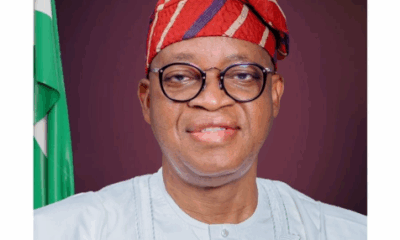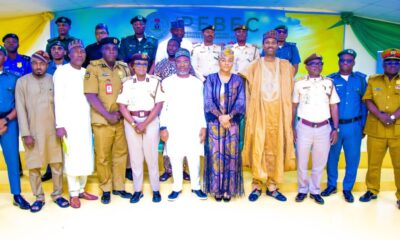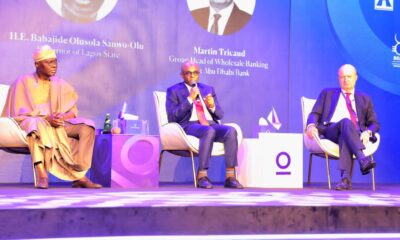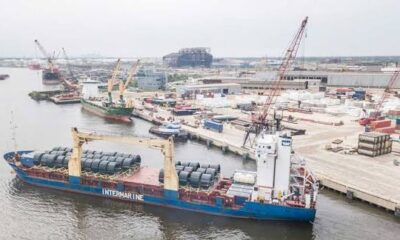Business Maritime
SILHOUTTE: Intrigues, MMCC And The Escravos Project
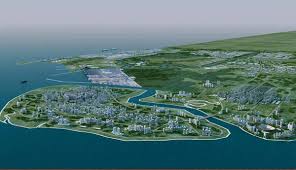
BY EGUONO ODJEGBA
Nigerians woke up recently to the alarm raised by Mercury Maritime Concession Company (MMCC), a Nigerian firm listed as the promoter of the proposed Escravos Seaport Industrial Complex (ESIC).
Among other things, Chairman of MMCC, Rear Admiral Andrew Okoja (Rtd) created the impression that his company has secured the project concession, and went on to say that MMCC has also found an international investor known as EDIB International of Hong Kong, which have expressed interest to commit $27.29bn to financing the project.
Then he dropped the ‘bad news’ that the Federal Government and the Delta State Government are delaying the project takeoff by withholding the necessary final approval which will enable MMCC and its foreign partner, EDIB International of Hong Kong commence activities.
For a nation seeking to grow its economic potentials and desirous of critical foreign investments to help unlock these potentials, MMCC lamentation touches the heart.
Rear Admiral Ojoja went on to say that the Escravos Project will redefine Nigeria’s investment history, industrialize the region, create jobs, pump up the national GDP and refocus the economy with the sprawling industrial park covering 31,000hectares of land to be provided by the Delta State Government.
The project he said will comprise of a Deep Sea Port, Crude Oil Refinery, Gas Complex, Independent Power Plant, Airport and Nature Park.
He said, “The delay in providing the necessary approvals by both the Federal and Delta State governments may result in Nigeria missing out on creating much-needed job opportunities and boosting the nation’s economy.
“ESIC will transform the economy of Delta State and other beneficiary states from a predominantly rural economy to one driven by metropolitan development of international standards. This project is modeled after the Lekki Deep Seaport/Free Trade Zone (FTZ) and aims to address the perennial port congestion problems in Nigeria.”
In a special appeal to President Ahmed Tinubu, he requested for the “confirmation of all privileges of FTZ and capital repatriation of ESIC project, as well an approved letter of comfort to MMCC to enable the financier to release ESIC project funds.
“We advise the Federal and Delta State Governments to take advantage of this three-week grace period before the expiration of this deadline or else the funds set aside for ESIC would be diverted to other needy African nations”, he said.
But responding to the claims of the MMCC big shot, the Nigerian Ports Authority (NPA) not only condemned his alarm but also faulted some of his claims as misleading; and giving off potentially wrong signals to the outside world.
In particular, the NPA explained that the project concession processes are yet to be finalized, noting that to give full vent to the unnecessary haste of the project promoter aside its misinformation would amount to a national disservice.
With its counter, NPA state that MMCC concerns are misplaced and laced with tendencies suggestive of attempt to stampede the federal government into unwarranted haste that could result costly mistakes.
While acknowledging that MMCC actually indicated interests in ESIC, NPA noted that certain aspects of the company’s proposal were incongruous with the spirit and letters of concession, open competition and fairness.
The Authority in a statement reads: “Mercury Maritime Concession Company Ltd (MMCC) submitted a proposal and wants Nigerian Ports Authority (NPA) to approve its request as the only deep seaport-free zone in the eastern zone of the country for decades to come.
“The NPA received many proposals for developing deep seaports, including Ibom, Burutu, Bakassi, Bonny, and Port of Benin, which are currently at different stages of review.
“The initial phase involves acquiring land. The availability and suitability of the site are essential for the successful development of the port. This process is yet to be accomplished. Although the classic position is for the Authority to acquire the land and grant a concession on it to the private party, recent concessions granted by the government allowed private parties to acquire the land, hold it for an agreed term, and, after recovering the cost, transfer it to the Authority. Examples are the Lekki and Badagry deep seaports.
“To undertake this project, the site for the port must be identified, and environmental impact assessments and scientific studies must be conducted to confirm suitability.”
Providing more clarification, NPA notes that Mercury Maritime Concession Company is not close to sealing the deal and hence is in no position to force government to act arbitrarily and otherwise.
“Additionally, we must adhere to the PPP process as per the applicable law, which entails submitting the OBC and FBC, obtaining a Certificate of Compliance from the Infrastructure Concession Regulatory Commission (ICRC), and seeking final approval from the FEC. Therefore, we highlighted the need to submit a business and investment proposal with a financial model that demonstrates the project’s recovery period and forms the basis for adopting the PPP framework.

“It is crucial to emphasize that the port is just one aspect of the overall development of the Industrial Park. This development encompasses petrochemicals and various manufacturing facilities. The required approvals for these aspects are not within the Nigerian Ports Authority’s jurisdiction. They would follow the process under the ICRC Act.”
Additional findings by Pinnacle Time revealed that despite its assumed big airs and boasting as an investment promoter, MMCC’s conduct may not have been more than that of a consultant.
The first red flag one observe is the company’s claim that the DESG has earmarked 31,000 hectares of land for the project. For those who are familiar with the area, the Escravos is no doubt an island. Where is the state government going to get that size of land mass from?
MMCC argued that the project is modeled after the Lekki Deep Sea Port and remarked that ESIC would be complimentary to the controversial on-going Lagos-Calabar coastal road.
Above claim is can be no more less than naked dishonesty, because, come to think of it, how does a port in Escravos, a remote island location complement a road that is unconnected in any material way?
While the retired general accused the FGN and NPA of frustrating the development of the ESIC project, there is no doubt that discerning Nigerians also understands the role of supervision and oversight relating to technical and regulatory issues.
Findings show that for whatever reason, the MMCC appears not quite willing to submit to necessary safeguards and oversight, one of which Pinnacle Time gathered is expertise advise to phase the project for ease of execution.
Investigation shows that PPP experts advise phased execution as a matter of procedure, not only for ease of investment administration, but also for related safeguards, both in terms of technical and regulatory interventions.
Phasing according to experts also provides financing flexibility that rests on investment integrity and security, believed to be a standard practice in projects of this magnitude. Professional insights indicate that an industrial project the size proposed by MMCC requiring over $27billion to execute, especially under a PPP arrangement, must of necessity be phased.
Strangely, there are indications the MMCC has not willing to submit to this necessary guideline and hence, adjudged as uncooperative. Perhaps, this explains the discrepancies in the allegation that the project is been delayed by government and its agencies.
An insider knowledgeable source informed that after reviewing the MMCC proposal submitted in 2019, the NPA advised on a number of issues including phased implementation of the project but that the promoter did not show interest.
“PPP department reviewed it and observed that the project comprised of a lot of developments even though the port is only complementary. We know that the cost of a brand new port everywhere is not more than $2b. In Nigeria, because of market conditions it could be higher.
“We advised them to phase it and commence with the container terminal before expanding to other phases based on demand. We know that the development of a deep seaport wouldn’t cost up to $1billion because it would have to be phased.
“So, we demanded that they should separate the cost of the port from all other costs because our purview and that of the Ministry of Marine and Blue Economy is only the port. So far, they refused to do that.
“Instead of replying us, they went to the press”, our source revealed.
As things stand, there is no doubt that MMCC’s behaviour have raised a lot of questions bothering on its character, competence and professionalism, either as an entity seeking to cut corners or one that believes it could bulldoze its way through regulatory safeguards regardless of processes and procedures, and regardless of best practices.
More than anyone else, an investment promoter is obliged to play by the rules, or else, leaves observers with unpalatable impressions, including the issues of probity and such essential concerns as the actual intent of such investments; whether tailored to grow the Nigerian economy or designed to milk the system.
MMCC’s financial partner, EDIB International of Hong Kong should be concerned about its investment reputation, not to be seen as anything else but a development partner.
The fallacy in comparing the Escravos Project to the Lagos Free Trade Zone is that whereas the latter from the implementation stage, already had lots of industries that are complementary to its services, which is unlike the Escravos Project on a virgin, greenview island devoid of industrial set ups.
Above is against the background that the proposed Escravos Project design has everything including the port inside. Experts say no promoter can develop all the components at the same time.
“There has to be a demand for the port. Without the other allied industries such as crude and gas refinery, independent power plant, airport and nature park listed in the design proposal, the ESIC port may be viable, it would be dead in the water”, an expert who does not wish to be identified commented.

